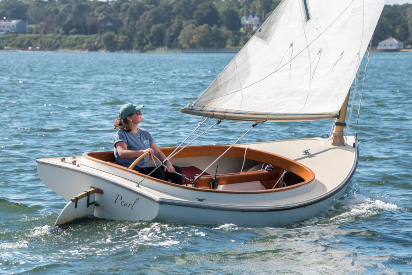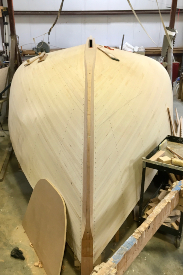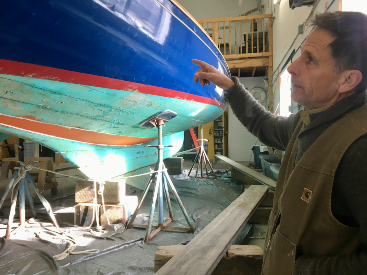Profile: Arey's Pond Boat Yard
This is one in a series of profiles of the boatbuilders participating in the Boatbuilders Show on Cape Cod. The show is the premier event for the region's boatbuilders, a local industry that sustains and grows the traditional craft.
Owner(s): Tony and Robin Davis
Established: 1954 (Tony and Robin became the third owner in 1991)
Number of employees: 12 (winter); 15 (summer)
Number of boats produced per year: 6-8 (depending on orders)
Specialty: 14' catboat
Contact: https://areyspondboatyard.com/
A 'neighborhood yard' on Arey's Pond
By Patrick Cassidy | patrick@capecodonthefly.com
ORLEANS - Tony Davis wasn't born on a boat but it wasn't long before he found himself on the open water.
"They say I was two years old when I did a sail from Plymouth to Maine strapped in a hammock on a 20-foot wooden boat," he said recently at the Ayer's Pond Boat Yard facility on Rayber Road.
As workers came and went, the buzz of activity framed Davis' soft spoken descriptions of how he learned to build boats, the trade's challenges and its potential. His hands and face appeared hewn with the same precision as the boats taking shape nearby. Later, as he walked from building to building, Davis appeared to move in concert with the work around him, speaking in concise phrases, carving away unnecessary words.
As a young man, he had two options: "either straighten out or ... find a trade," the 62-year-old Davis said.
He wasn't good at school and his only other choice was to keep sailing around the world delivering boats.
"I found that fascinating and everything but ... I wasn't developing a skill."
While working on boats, his natural curiosity kicked in.
"I'm looking at all the joints and I'm looking at the deck beams and I'm looking at the spars and I'm saying how the hell did they do this," he recalled. "I didn't realize it at the time because I was young but as I obviously get older ... it has become pretty clear that there was always this curiosity."
Landing the position of top rigger at a prestigious yacht yard in Florida when he was still young gave him the confidence to know he could take it to the next level.
At the time, there were far fewer options than now exist to learn boatbuilding.
But, with his father's help, he "found a path," apprenticing with Maine boatbuilding legend Arno Day, Davis said. (Day died in 1998 at age 81.)
"I was like one of the early apprentices," Davis said about his time traveling back and forth between apprenticing in Maine and working in Florida.
Day also taught his young charge the basics of yacht design.
"So these boats that we have out here, these 14s and 16s ... and some of these custom wooden bigger boats, are boats that I designed," Davis said.
Now, there are more opportunities to learn the craft, including at the Landing School in Maine or Rhode Island's International Yacht Restoration School (renamed IYRS School of Technology and Trades).
"It's a huge resource for us," Davis said about the schools. "I can't hire some guy who works on a house to put planks on a boat. They might have the skills, the woodworking skills, because they do cabinetry but they don't have the knowledge on how to spile a plank and fit it and all that."
And, although the masts may now be carbon fiber and the rigging has been simplified on the catboats they are best known for, Arey's hasn't strayed far from the original design, he said.
"We just believe the catboat is a great design for the shallow waters here," Davis said.
But the changes - which Davis hesitates to call improvements - have made the boats more comfortable and faster on the water.
"This is designed more for entry level and it's pretty straightforward whereas the old catboats, every one was a little bit different and nobody knew which line did this and did that," Davis said.
 |
 |
 |
The Boatbuilders Show on Cape Cod is an opportunity for potential
buyers to learn how much craftsmanship goes into each boat, he
said.
"They're used to the Boston boat show or Providence or whatnot
and it's a whole different level of experience," he said about
attendees at the Cape show, adding that the designs on display
are similar in some ways but with very different details.
Visitors will also likely be talking to the person who designed
and built the boat in front of them.
"In (a) boat show like the Cape Cod boatbuilders show the person
asking the questions and getting interested in the particular
boat that the builder's bringing realize this is their life," he
said. "I'm not talking to a salesman."
It's also a boat that was built locally. And, while there may be
some sticker shock at first, the cost is comparable to other
boats and even other popular activities.
"You know biking is huge on the Cape so a bike, a well-made bike,
is like $12,000," Davis said. "We can build a really nice rowing
skiff for like $12,000 so you can put it in the back of your car,
on your rack, and you go out for a nice row in a handmade
beautiful rowboat and ... you're working your upper body not your
lower body, but you're getting a workout in a beautiful handmade
boat."
It's important for potential buyers to consider the Cape show and
what local boatbuilders can offer before assuming they need to
buy an inventory boat, he said.
The show also makes it a little easier on the local boatbuilders
who would otherwise have to trailer their products much farther
for a similar showcase. Because the show is local, they get to go
home and sleep in their own beds at night, he said.
The show is also a visible display of the potential size of an
industry that gets far more support in other New England states,
Davis said.
"You add up all the employees from the boatyards in Provincetown
all the way down to Falmouth, that's some numbers," he said.
And, although his boatyard isn't making much money, it provides
cash flow and gives employees an opportunity to do what they love,
Davis said.
"We're doing something we're passionate about and there's a lot to
be said for that in this day and age," he said. "It's all about
jobs, living on the Cape"
The alternative is a seasonal community where workers are bussed in
to work at resorts, according to Davis.
"Is that what you want?" he said. "No, of course not, you want
industries like boatyards."
Davis said he struggles to ensure his employees can make a living.
"The most stress I carry is being able to make sure these guys can
make a decent living," he said. "We do 100% health and try to make
it a living wage but it's hard."
For many boatbuilders on Cape Cod and beyond - some who run their
own shops now - the boatyard's waterfront facility on its namesake
pond is where they first cut their teeth (and probably a few
fingers).
The location a short sail from Little Pleasant Bay is no longer
used for boatbuilding because of environmental concerns but is
still a busy waterfront operation that includes an active sailing
school and a canvas shop a short distance away.
It's a full service operation and a lifestyle.
"We'll teach you how to sail, get you a mooring, or we can build
you a boat or we can maintain a boat for you," Davis said. "We're a
sailing center, we teach sailing - private and group lessons - and
that's sort of our mantra, we want people to know how to sail. We
like to think of ourselves as a neighborhood yard."
Patrick Cassidy is a Harwich-based writer. He is also the founder and
captain of Cape Cod on the Fly, a boat and shore guide service to
fly fishing the flats of Cape Cod.


